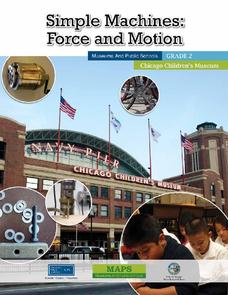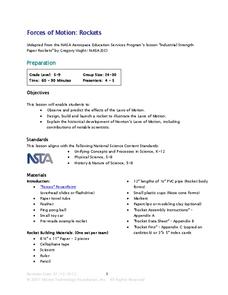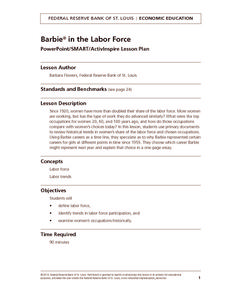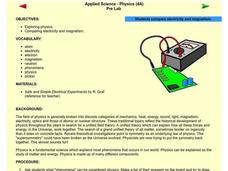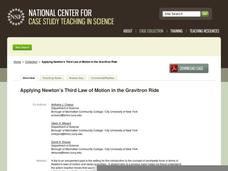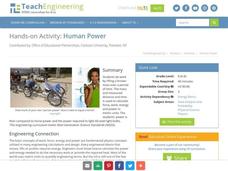Chicago Children's Museum
Simple Machines: Force and Motion
Get things moving with this elementary science unit on simple machines. Through a series of nine lessons including teacher demonstrations, hands-on activities, and science experiments, young scientists learn about forces, motion,...
University of Florida
Understanding Car Crashes: It's Basic Physics!
Make an impact on young physicists with this fun collection of resources. After first watching a video and taking notes on the physics of car crashes, students go on to complete a series of activities that explore the...
Micron Technology Foundation
Forces of Motion: Rockets
Young scientists design a rocket to launch using Newton's Laws of Motion in order to discover for themselves the forces of motion.
Teach Engineering
Energy Basics
Power up your lessons with an energetic resource. Scholars learn about work, force, energy, and power. They consider the relationships between these quantities through hockey puck scenarios and make calculations using formulas.
Federal Reserve Bank
Barbie in the Labor Force
How have the women's share of the labor force and chosen occupations evolved in the United States over the last century? Using census reports, graphs detailing the gender makeup of the labor force, and analysis of the careers of...
EduGAINs
Form and Function
Will that structure survive the force? The differentiated lesson allows pairs to choose the structure they would like to construct and the building materials they wish to use. Individuals record their findings in...
Curated OER
Freestanding Structures: A Tech Museum Floor Activity
Young scholars attempt to design the tallest structure that they can with the given materials which are wooden dowels and rubber bands. They discuss the physics of their structure and how they would improve it the next time they built a...
Curated OER
Introduction to Forces and Inertia
Students explore the basic underlying concepts of Newton's first law of motion. They discuss forces and brainstorm different examples of force and what they act on. Students examine force by observing springs and gravity. They discuss...
Norwich Institute for Language Education
Simple Machines
Planning a unit on simple machines? Save some time and energy with this collection of lessons and activities that explores how these devices are used in the real world to make life a little easier.
Curated OER
Electricity and Magnetism
Fourth graders compare electricity and magnetism. In this science lesson plan, 4th graders discuss the concepts of electricity and magnetism and brainstorm examples of electrical and magnetic forces.
Oceanic Research Group
Heat Transfer and Cooling
Astronauts train underwater to simulate the change in gravity. An out-of-this-world unit includes three hands-on activities, one teacher demonstration, and a discussion related to some of the challenges astronauts face. Scholars apply...
Colorado Unit Writing Project
Simple Machines
Planning an elementary science unit has never been simpler! These twelve lessons guide young scientists through an exploration of simple machines and their many uses in the real world before asking them to apply their learning...
National Center for Case Study Teaching in Science
Applying Newton’s Third Law of Motion in the Gravitron Ride
Here is a collection of readings to be discussed in the science classroom. This one is in the form of a dialog between two boys in an amusement park, talking about the forces involved in a Graviton ride. Questions are listed at the...
Curated OER
Engineering: Simple Machines
Fourth graders participate in activities to examine how simple machines help build things. They identify the six types of simple machines. They discover how simple machines where use historically to build pyramids and how they are still...
PHET
Earth’s Magnetic Field from Space
Feel the pull of science! The final installment of this 18-part series is an application of everything learned in the previous high school lessons. Scholars are given a magnetic field map and must propose an arrangement of magnets that...
Curated OER
Roller Coasters
Twisting and turning through the sky, roller coasters are popular attractions at amusement parks around the world, but how exactly do they work? Explore the physics behind these thrilling rides with an engineering design activity....
DiscoverE
Slinky® Science
Toys are great for learning about physics. Scholars use Slinky® toys to study Newton's laws of motion and types of energy. After a little play, they then model longitudinal and transverse waves with the Slinky® toys.
California Polytechnic State University
Australian Geography Unit
At the heart of this resource is a beautifully detailed PowerPoint presentation (provided in PDF form) on the overall physical geography of Australia, basic facts about the country, Aboriginal history, and Australia culture and lifestyle.
Teach Engineering
Human Power
How many humans does it take to power a light bulb? The 10th part of a 25-lesson Energy Systems and Solutions unit has learners conduct an experiment to calculate power. They then use the results to determine how many classmates they...
Curated OER
Keep It Hot
Students design and conduct an experiment to explore the insulating abilities of different materials for keeping a liquid in a paper cup warm. A small group of lab partners test four different materials: black paper, white paper,...
NASA
Two Versions of Gravity: Newton and Einstein
We have all heard the debate about teaching both theories, but an innovative lesson takes the discussion to a new level. Scholars research and debate Newton's Law of Gravitation versus Einstein's General Theory of...
Kenan Fellows
Sensors in Chemistry
The Environmental Protection Agency monitors sensors to track air pollution and set clean air standards. Enthusiastic young scientists use similar sensors to gather data in their area and then apply the gas laws and conservation of...
Curated OER
Physical Science Project-Atom
Fifth graders investigate atoms. In this atom lesson, 5th graders investigate the parts of an atom. Students explore atom numbers and determine the number of electrons is in each atom.
Teach Engineering
The Advantage of Machines
Show your students how to make their work easier. The first lesson in a series of 10 introduces the class to work and the way simple machines can be make work easier. The simple machines scholars can find in everyday items are...
